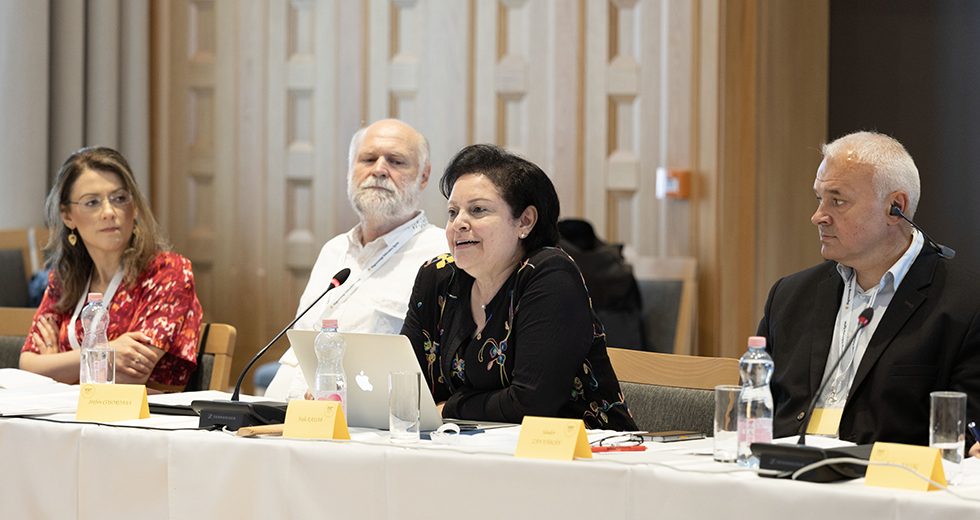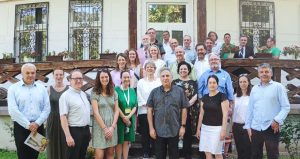Future of Ukraine focus of conference
Posted on July 27, 2023 by Phil Tanis

“The war in Ukraine has posed new questions, new challenges, and new ways of thinking about our mission as a church. We are challenged today to be a relevant church—an impactful church that dares to have a prophetic voice in the public sphere,” said Najla Kassab, president of the World Communion of Reformed Churches (WCRC), at a conference in Budapest, Hungary, and Transcarpathia, Ukraine.
Initiated by the Reformed Church in Hungary (RCH) in cooperation with the Reformed Church in Transcarpathia, the “Ukraine Future Conference” was held 14-15 July, bringing together church and ecumenical leaders from around the world.
“We are together—sisters and brothers—from East and West, from the crisis zones, neighboring countries—and together we have a clear position: we don’t know how to bring an end to the war, but we know what we personally and as churches must do: HELP,” said Zoltán Balog, RCH bishop.
The consultation included three different panels presenting perspectives and initiatives on peace, justice, and reconciliation from Europe, the Middle East, South Korea, and various churches in Ukraine. The second portion of the consultation included worshiping with the church in Transcarpathia and sharing words of support and prayer with the ministers there.
“The war in Ukraine urged us to handle the injustice and to be a church that relates directly to the suffering of the people. To serve the refugees and protect the dignity of the people,” said Kassab, who is also a minister in the National Evangelical Synod of Syria and Lebanon.
In her address to the conference—Christian Vision for Societies Affected by War: Restoration and Reconciliation–Kassab said, “As a church who has struggled for years in the Middle East with war and enmity, our concern has always been how to preserve our values and not to react merely to the violence that surround us. In the midst of war, we are tempted to react and get distracted from the principles that we lived in.
“To be a church of reconciliation we are called to hold firm to our beliefs even when that could mean to pay a price; even when our stand does not sound to be popular or appealing to many,” she said.

Drawing on recent experiences in Lebanon, Kassab said, “One of the challenges that we face today in understanding mission is the urgent need for the church to go outside the walls of the church. In the last years our church in Lebanon started a new ministry, opening schools for Syrian children refugees who were left on the streets with no education and with the threat of abuse. Going out to the streets and tents and bringing children from refugee camps transformed drastically our understanding of discipleship. It was a time where our Presbyterian church discovered a new way of becoming the church, where the refugees around us taught us anew how to be the body of Christ in the world.
“When we discover meaning in the way we live, then we see the hope in the middle of our struggle. In living Jesus’ story, values and love we start to see glory that Jesus promised. We are not locked in the tomb of our suffering and believe that there will be a better tomorrow,” said Kassab.
The Ukraine Future Conference built upon the ongoing work of partner churches, church organizations, and the churches of Ukraine to build upon their relationships and allow for an ongoing precedent of open dialogue on just peace.
Participants came from churches in Belgium, Croatia, Germany, Hungary, Italy, Lebanon, Ireland, Poland, Romania, Scotland, Serbia, Slovakia, South Korea, Switzerland, Syria, the United States, and Ukraine. Besides the WCRC, church organizations represented were the Communion of Protestant Churches in Europe and the Conference of European Churches.
(The Reformed Church in Hungary contributed to this article. Picture by Hurta Hajnalka.)
 World Communion of Reformed Churches
World Communion of Reformed Churches